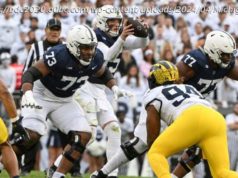She’s a heavy favorite to sweep the Olympic Games slalom, giant slalom and combined golds, and has heard the comparisons to the medals machine that is Phelps. But she admits to battling menta…
PYEONGCHANG, South Korea — Mikaela Shiffrin does not display her Olympic gold medal and much of the rest of her growing collection shiny medallions for all to see. Neither does she keep them locked up in a steel vault.
“I put them in socks,” said Shiffrin, the 2014 Olympic slalom champion.
“I heard before Sochi that is a good place to keep your medals,” she continued referring to the site of the 2014 Games. “You put it in a sock and it keeps it kind of safe and you can pack it away somewhere.”
Which should put “buy more socks” or even a new sock drawer near the top of Shiffrin’s post-Olympic to do list.
Shiffrin, the 22-year-old from Vail, Colorado, is a heavy favorite to sweep the Olympic Games slalom, giant slalom and combined golds in Pyeongchang. Should she decide to contest it, Shiffrin would also be considered a medal contender in the Super G, even though she has only skied the event twice this season. It’s also worth pointing out that Shiffrin won the downhill at a World Cup event in Lake Louise earlier this season. It was just her fourth World Cup downhill.
All of which make Shiffrin along with Chloe Kim, the American teenage snowboard sensation, the new face of the Winter Games.
“I would like to compete in everything but I’m not sure if I’m going to have the energy to do that,” said Shiffrin, who opens her 2018 Olympics campaign with Sunday’s giant slalom. “Right now I’m focusing on the GS, and slalom and after that I’ll be switching the focus to speed (events). The decision ends up being with the coaches as to who’s the best medal contenders but I always have the options to pull myself out of race if I don’t feel prepared. Right now we’re looking at any possibility, actually.”
Shiffrin has already put up some big numbers this season, winning 10 of 17 Grand Prix races in 2017-18, including a stretch where she won five World Cup events in nine days. Already at 18, the youngest skier, male or female, to win the Olympic slalom gold, Shiffrin last season became the first female skier to win three consecutive World slalom titles in 78 years.
A resume that also includes 41 career World Cup victories and the 2017 World Cup overall title has led some to compare Shiffrin’s domination of her sport and the Winter Olympics to Michael Phelps reign over the Summer Games. Phelps, the most decorated Olympian of all-time, owns of 28 Olympic medals, 23 of them gold.
It is a comparison that Shiffrin calls “crazy.”
“He has, what, 23 (gold) medals?” she said. “I know it’s a comparison between sports, but I don’t think there’s a sport in the Winter Olympics where you can ever win 23 medals across three or four Olympics. I could never imagine myself even in the same sentence as Michael Phelps. It’s extremely flattering but it’s apples and oranges.”
The Phelpsian expectations and a demanding competition schedule, however, have taken a toll on Shiffrin.
After the five-race winning streak, Shiffrin finished third in her next World Cup stop and then seventh in each of her final two races before the Olympics. She arrived in South Korea wondering if she wasn’t out of gas.
“I got tired going into the Cortina (Classic), which I think put me over the edge a little bit,” Shiffrin said referring to a World Cup event in Cortina d’ Ampezzo, Italy.
“By the Super G day in Cortina I was exhausted,” she continued. Shiffrin missed a gate in the Cortina Super G and was visibly frustrated on the hill afterward. “And that was where that mental fatigue came in. I think that came from underestimating how much energy it takes to do speed like that and to learn new tracks.”
It wasn’t the first time Shiffrin has complained of mental fatigue.
She struggled with anxiety through much of the 2016-17 season, vomiting before races and suffering from stomach cramps.
“I’ve experienced a lot more mental stress in these last two years than I’ve ever had,” Shiffrin said. “I don’t know what it was about last season but I’ve spoken about it a lot. I felt a lot more anxiety and I started to take to a sports psychologist about that.
“There’s a difference between mental and physical fatigue. Athletes feel physical fatigue throughout the whole season on a daily basis, but when you add mental fatigue to that, for me that’s the hardest thing.”
That fatigue was evident in her final pre-Olympic World Cup event in Lenzerheide, Switzerland January 27.
“I was skiing really well so I thought everything was fine,” Shiffrin said. “But I wasn’t able to keep my mental focus until the finish, which is something that I should pride myself on being really good at normally. When I’m not able to excel in the last quarter of the course or keep that focus through to the finish, that’s when the red lights are flashing and I think that I need to change something.
“That’s the biggest issue and it’s not always easy to tell. When I get mentally tired I just get more emotional, annoying to my coaches and I’m not very fun to be around and I can’t focus as easily. All those things that are part of who I am sort of disappear.”
Shiffrin has spent much of the last two weeks trying to re-charge physically and mentally.
“I kind of got back to my roots in skiing a little bit and reminded myself that I’m not here just for wins but I’m here because I love the sport. I love to improve, and I love to feel when I race well.”
Which brings us back to her socks.
Shiffrin was asked this weekend just where she keeps her, uh, socks?
“I’m not going to tell you the exact location,” she said, “in case you want to go into my house and steal it.”






